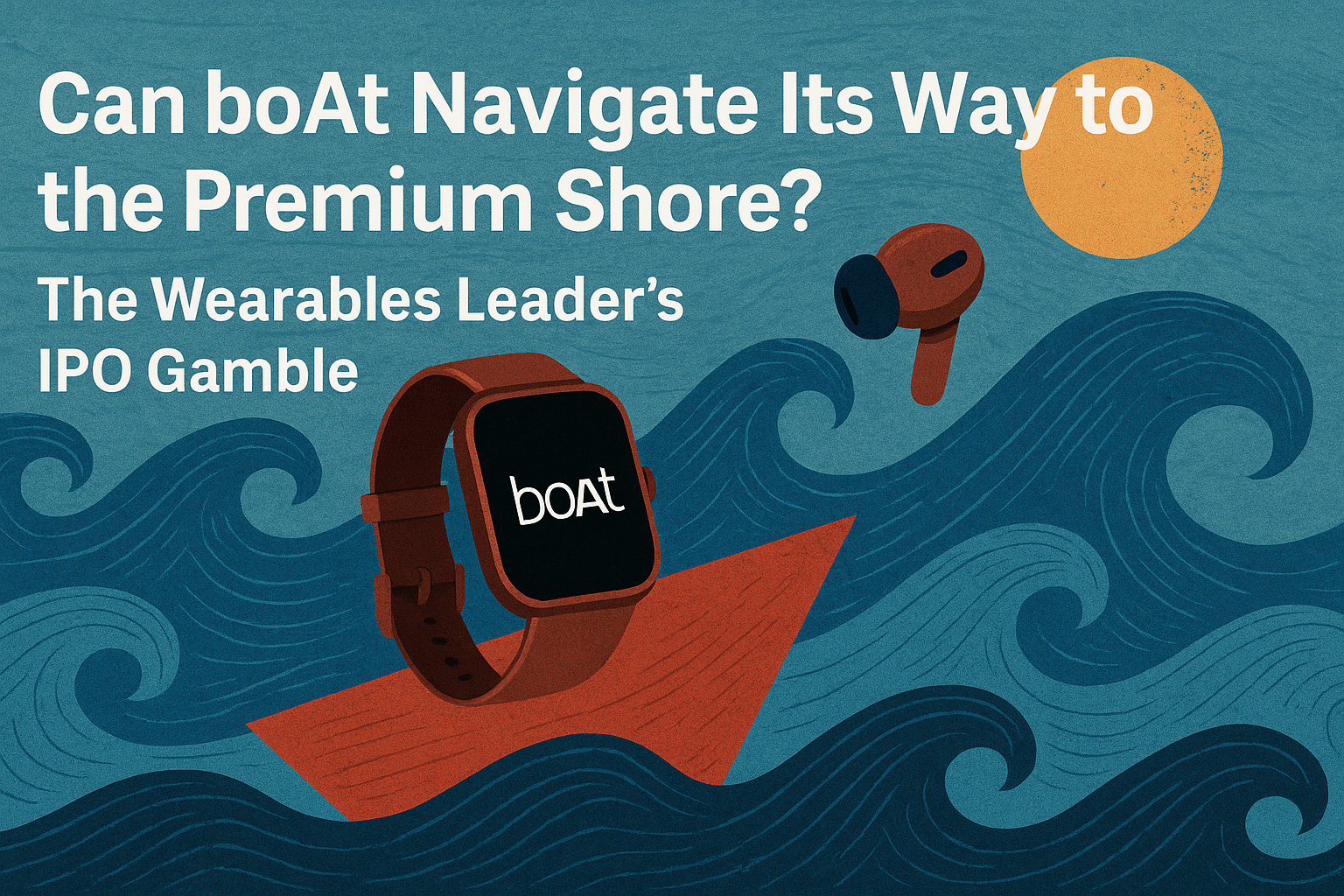Five years ago, when the covid-19 pandemic confined millions to their homes, India’s electronics market was flooded with a new breed of homegrown brands offering cheap, lookalike smartwatches and wireless earbuds. These low-cost devices created a price war that soon spiraled into a race to the bottom. Amid this noise, one brand—boAt, launched in 2016 by Gurugram-based Imagine Marketing—managed to ride the wave better than most, becoming synonymous with affordable wearables. Now, nine years later, boAt is steering toward uncharted waters: the premium segment, just as it prepares for a ₹1,500-crore initial public offering (IPO).
But can a brand built on budget-friendly devices truly transform its image and margins in a slowing market?
The IPO Voyage: A Second Attempt
boAt’s latest IPO filing marks a renewed push after its first attempt in 2022 fizzled out due to unfavorable market conditions. This time, the company is eyeing ₹1,500 crore, with ₹500 crore from fresh shares and ₹1,000 crore via an offer-for-sale (OFS) by early investors like Fireside Ventures and Qualcomm Ventures.
Interestingly, boAt itself will receive only one-third of the total proceeds—₹500 crore—for its own operations, including ₹150 crore set aside for marketing and brand visibility. This suggests a recognition that shaking off its “budget brand” image will require a heavy promotional lift.
The Brand Dilemma: Value vs. Premium
boAt’s biggest challenge lies in shedding its “value tag.” As Navkendar Singh from IDC India points out, the Indian consumer electronics space thrives on reliability and affordability. “The resilience of value brands is strong,” he says. “In such a market, can boAt shed its value tag and start selling premium products? It will definitely be difficult.”
The data supports this concern. boAt sold 7.5 million smartwatches in 2023, but only 4.1 million in 2024, mirroring a broader 35% market contraction. On the audio front, boAt remains the leader, selling 28.7 million earphones in 2024, slightly up from 27.3 million the previous year. Yet, this growth is modest amid a plateauing market.
India’s smartwatch sales peaked at 53.4 million units in 2023 before plunging to 35 million in 2025, while audio products, though still expanding, are seeing slowing growth. For companies like boAt, attempting to climb the value chain could mean sacrificing volume for margin, a tricky tradeoff in a market conditioned to expect low prices.
R&D: The Missing Engine?
To evolve into a premium brand, innovation is key. In 2022, boAt established boAt Labs, its R&D arm, signaling intent to move beyond rebranded OEM products. However, actual R&D spending has remained modest—between 1.3% and 1.7% of revenue over the past three fiscal years.
In FY25, the company earned ₹3,097.81 crore in revenue and turned a ₹61 crore profit, but its draft IPO papers reveal little about how future R&D investments will be allocated. Analysts like BNP Paribas’ Nirransh Jain warn that Indian electronics companies typically prioritize scale and distribution over innovation: “Most invest just 1–1.5% of net sales in R&D. Without clear product differentiation, premium aspirations remain just that—aspirations.”
Searching for New Shores
Beyond the Indian market, boAt has ambitions abroad. The company is reportedly in talks with distribution partners in the UAE, with plans to expand into South Asia and Southeast Asia. Still, it has not outlined a timeline or specific strategy.
Since inception, boAt has raised around ₹1,350 crore ($162 million) from private investors, including Warburg Pincus and Qualcomm Ventures. Notably, neither Warburg nor the founders—Aman Gupta and Sameer Mehta—are selling their shares in the IPO, suggesting confidence in the company’s long-term prospects.
The Sharks and the Spotlight
boAt’s IPO comes just as another “Shark Tank India” face, Peyush Bansal of Lenskart, is preparing his own market debut. While Lenskart’s ₹70,000 crore valuation has sparked debate, boAt’s listing will likely attract similar scrutiny.
Interestingly, leadership shifts have also reshaped boAt’s narrative. With Sameer Mehta stepping down as CEO on 30 September, Aman Gupta—the company’s charismatic co-founder and CMO—has become the brand’s public face, leveraging his television fame to boost visibility and consumer trust.
Conclusion: Will the Tide Turn?
boAt’s journey from a budget audio upstart to a would-be premium electronics player encapsulates the broader struggle of India’s consumer tech ecosystem: balancing mass appeal with innovation, and volume with value.
While its IPO may fund fresh marketing and R&D efforts, the real test will be whether Indian consumers—accustomed to equating boAt with affordability—can accept it as a premium brand. For now, boAt remains at a crossroads: confident, well-funded, but facing an uphill sail against entrenched perceptions and tightening market tides.
Feel free to share your experiences and insights in the comments below. Let’s continue the conversation and grow together as a community of traders and analysts.
By sharing this experience and insights, I hope to contribute to the collective knowledge of our professional community, encouraging a culture of strategic thinking and informed decision-making.
As always, thorough research and risk management are crucial. The dynamic nature of financial markets demands vigilance, agility, and a deep understanding of the tools at your disposal. Here’s to profitable trading and navigating the election season with confidence!
Ready to stay ahead of market trends and make informed investment decisions? Follow our page for more insights and updates on the latest in the financial world!
For a free online stock market training by Yogeshwar Vashishtha (M.Tech IIT) this Saturday from 11 am – 1 pm, please sign up with https://pathfinderstrainings.in/training/freetrainings.aspx
Experience profits with my winning algo strategies – get a free one-month trial with ₹15 lakh capital! – https://terminal.algofinders.com/algo-terminal
Disclaimer
This article should not be interpreted as investment advice. For any investment decisions, consult a reputable financial advisor. The author and publisher are not responsible for any losses incurred by investors or traders based on the information provided.


